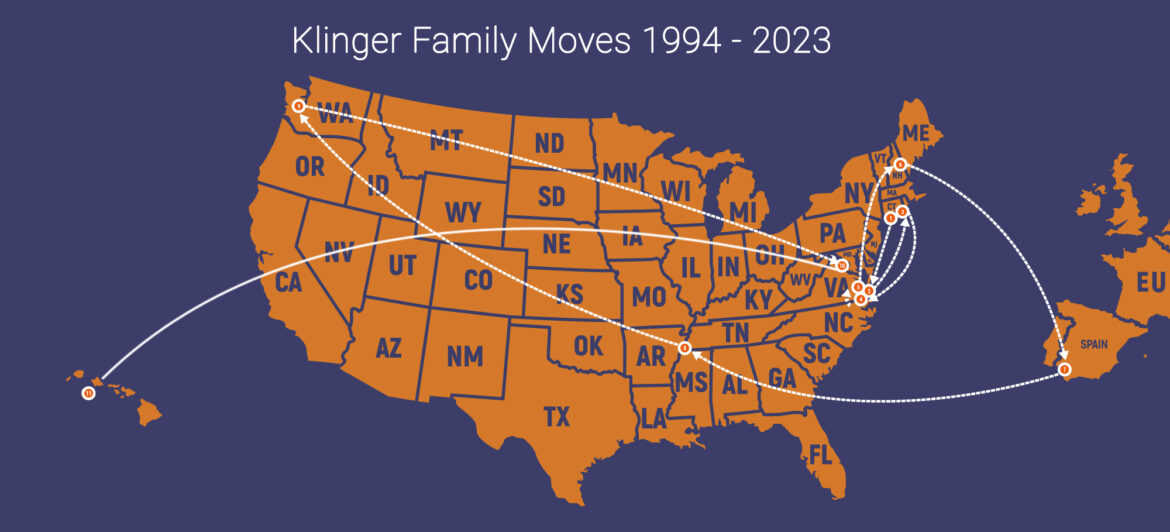Trailing spouses are forced to encounter change more than the average human, often without much support. In my 28 years as a Navy wife, my family has experienced close to a dozen house moves, including six different states and one overseas tour. Throughout this adventure, I’ve continued prioritizing my professional advancement as a creative marketing professional. In the past, pursuing your own career dreams hasn’t been expected of military wives — but times are changing and I hope sharing my story publicly inspires others to never give up on their dreams.
Continued from part 5 of Erica’s story.
My family has just packed up and moved more than a thousand miles away for the 11th time, prompted by my husband Jeff’s U.S. Navy career.
As we prepare to move from Hawaii to Maryland, it seems like a good time to reflect on our previous relocations, especially our last two cross-country shifts: from Washington state to Washington, D.C. in 2016, and from there to Hawaii six years later.
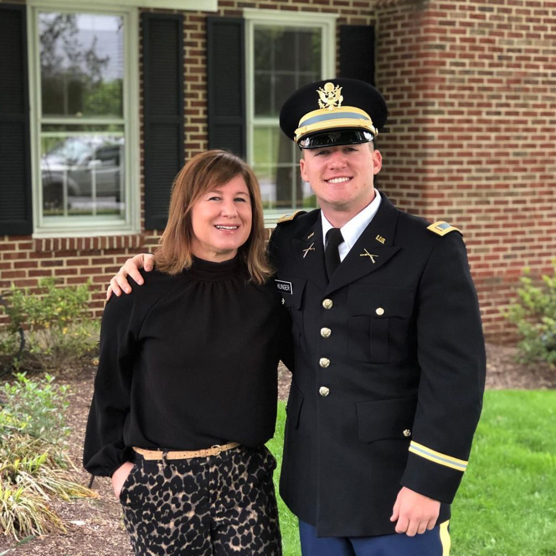
In 2016, beyond the geographic differences, the culture of America’s two Washingtons couldn’t have been more different. I had loved the casual jeans-and-tattoos vibe of the Seattle area — a stark contrast with the power suits, prestige, and politics of Washington, D.C.
At first, I rated this move as only a 5 on the 15-point Gupte Scale — but I later amended it to an 11. I had underestimated the value of being near family again on the East Coast: my sister right in D.C., the rest within driving distance in Philadelphia and Connecticut. Our son was starting his freshman year at the University of West Virginia, which was relatively close, and my younger daughter Tatum was excited to be starting at a high school in a warmer climate (compared to the Pacific Northwest) with a longer season for competitive softball. Even our oldest daughter Zoee, who had stayed back in Seattle, ended up deciding to move to Charlottesville, Virginia in 2021 while her boyfriend attended medical school at the University of Virginia (UVA).
Whenever a major life change happens — whether it’s a challenging job search in a new part of the world, or the COVID pandemic that struck four years later — having a family support structure around you can make all the difference.
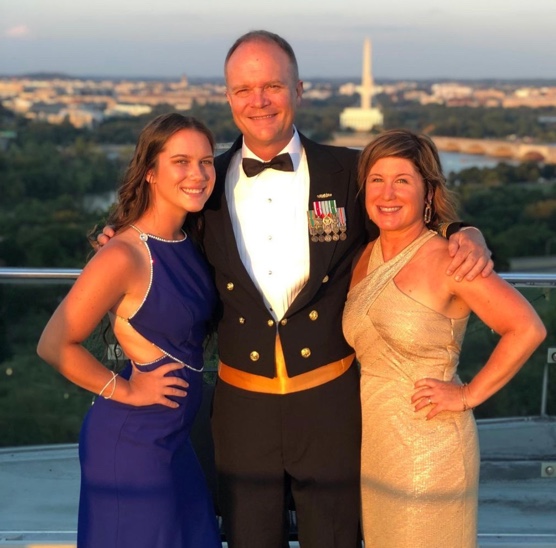
Flexibility and versatility pay off
For trailing spouses looking for flexible, versatile career opportunities that don’t necessarily require advanced degrees or experience, I always recommend exploring my field of digital marketing. Digital channels, especially social media, are now a core part of most business growth and engagement. Google provides training and professional certifications for areas around IT, Project Management, Data Analytics and UX Design and could be a good way to get into a position quickly in a high-growth field.
Compared to the other places I had lived, D.C. seemed to have plenty of nonprofit digital marketing opportunities, but I lacked a strong local network. I began by updating my LinkedIn profile, then submitting it to over 30 openings. (Don’t give up or get discouraged!)
I reviewed listings on Indeed, LinkedIn and other widely-known search engines, but I also looked at more niche local listings. For example, there’s an association that is the association for associations. (Seriously!) ASAE lists job openings that aren’t always found on the more common job boards; USA Jobs also has all the government openings.
I also looked through blogs and listings for “top nonprofits” and “best places to work” in the D.C. area, and searched those websites to see if they had posted any openings. Then, I went to my LinkedIn network to see if I was connected with anyone in that organization. If I was, I found that by sending them a message, they were willing to forward my resume to the hiring managers or meet with me to share more about the work culture there.
At this point in my career, I had hoped to land a more senior director role with room for growth. I held out as long as I could before accepting a linear move to another director role, this time at an association for the generic and biosimilar and medicines industry on Capitol Hill.
Overcoming imposter syndrome
My new employer, the Association for Accessible Medicines (formerly the Generics Pharmaceutical Association), was a small trade organization representing the manufacturers of generic and biosimilar medicines with fewer than 20 employees. As their first-ever marketing director, my role was similar to the branding and marketing initiatives I had undertaken at Seattle Foundation. The main difference I found in D.C., however, is that marketing and communications staff were also expected to have public affairs and advocacy expertise.
Legislation and lobbying was a new world for me, and I lacked direct experience in this area. Still, I seized this as an opportunity to expand my skill set, deepen my understanding of advocacy, and create meaningful change in people’s lives. I know making this kind of expertise leap can be intimidating, but employers do like to bring in new perspectives, too.
Have confidence in your life experience as a traveling spouse. Your ability to adapt quickly to change and integrate with all types of cultures is an advantage!
-Erica Klinger
I also felt confident that my previous work as a fundraiser in the health care sector at St. Jude and working with community health grants at Seattle Foundation was similar enough — and could bring a new perspective to rallying everyday people around public issues, including the need to address the skyrocketing cost of prescription drugs.
By applying my diverse skills in branding, design, marketing, data, and technology, we quickly built a strong foundation of 20,000 advocates and made progress on providing access and bring down prescription drug prices for patients in the U.S. in just two years. In my first year, we won two of the coveted ASAE gold awards to best website app and rebranding campaign and was recognized by our peers at the Public Affairs Council for a Communication Innovations Award. I was also promoted to Senior Director and had ample budget to hire new marketing resources which allowed me to focus more on strategy, partnerships and elevate the quality of our creative work.
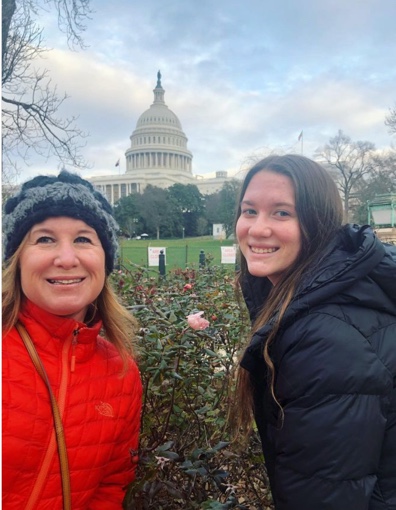
But despite the successes at work, I faced challenges outside the office. The daily commute to and from work from our home in Northern Virginia took nearly two hours each way on public transportation. As much as I was passionate about my career, it was beginning to overshadow my personal life.
And then, the COVID-19 pandemic hit.
Our world turns upside down
Our son Leif, a University of West Virginia student planning to graduate as a U.S. Army officer with the ROTC program in 2021, was sent home during Spring Break and needed to figure out how to train and get ready for his first duty station. Our younger daughter Tatum had to transition to virtual learning for the remainder of high school and deal with her feelings over missing key milestones like her senior prom and team sports. Our oldest daughter Zoee was still in Seattle, right at the epicenter of America’s outbreak.
My husband, an active-duty officer in the U.S. Navy’s Medical Service Corps, had to report for his one-year deployment to Afghanistan in 2020, which couldn’t have happened at a worse time. In addition to our anxieties about the pandemic, there were so many social and political issues at the time with the change in presidency; helping my family navigate through these months required full-time mom time. This put a strain on me, as both a wife and marketing professional whose “mom skills” had grown rusty due to my long commute.

But we embraced the positives. Like many other families who suddenly found themselves at home for the foreseeable future, we decided to adopt a “pandemic puppy” named Gleyber (named after the shortstop on the Yankees Gleyber Torres), a two-month-old red fox lab who quickly distracted us and served as our new focus and mental health therapist.
Reunited, then reconfigured
After 10 months apart — Jeff’s sixth such deployment during our marriage — my husband came back in time for Thanksgiving and to see how our kids had overcome so many new challenges. I felt thankful to still have a career, working from home for an organization that had allowed its staff to remain 100% remote, as Tatum was heading into her senior year and our son was off to Texas for his first duty station. We all spent the remainder of the pandemic at home, navigating a shared space.
After Tatum committed to attending the University of Tennessee in 2021, my husband and I suddenly found ourselves as empty nesters.
For 28 years, our kids had been a large influence and consideration in our military moves; we now had to make decisions based on where just the two of us wanted to go in this next phase of our lives (and as many others can related, we didn’t have a plan)!
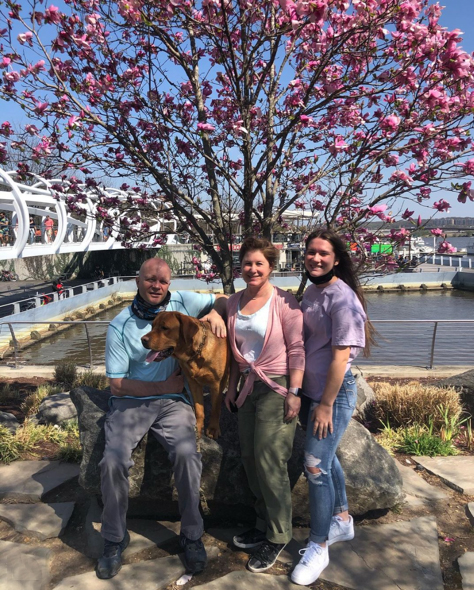
We understood that “home” is not one place but the feeling you have when you see family and friends. From our pandemic experiences, we also felt newly confident that we could stay connected via Zoom and social media, wherever our next move would take us.
The COVID-19 pandemic had prompted many of us to reconsider what truly matters in our lives, such as the well-being of our families, our career paths, and our mental health. For the first time, I really felt an urgency to chase my dreams before another unexpected obstacle could hit.
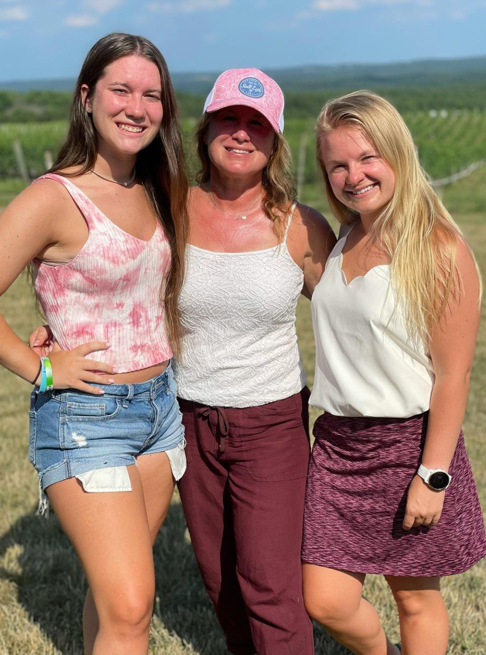
In the spring of 2021, my husband was offered an opportunity for a 2-year tour at the Pearl Harbor Naval Base on the island of Oahu. He had the option of going solo, but after his recent deployment in Afghanistan, that didn’t feel like the best move for our marriage. No longer feeling rooted in any place or thing, I decided to accompany him and explore another part of the world.
Goodbye, D.C. and Virginia… aloha, Hawaii!
Click here to continue to Erica’s adventures in Oahu.https://www.trailing-spouse.com/aloha-navy-wife/

